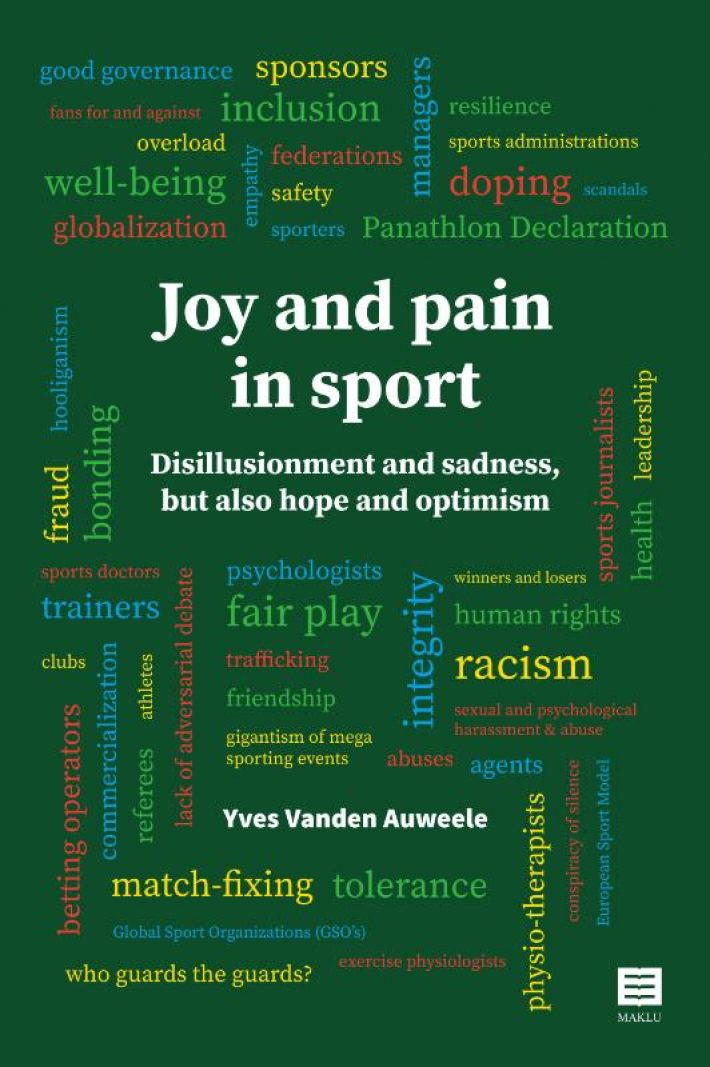dit werk kent de volgende uitvoeringen
verschijningsdatum30/10/2022

When fellow countrymen win a medal at an international sports event the whole spectrum of positive and negative emotions is expressed, by athletes, spectators, even by the strongest sports-critics and sports-indifferent people. There are winners and losers, fans for and against, sadness and disillusionment, abuse and injustice, grief and pain but there is also fair play, empathy, integrity, joy and optimism. In this essay, I write about abuses, dangers and challenges in sport, what causes them and how we can manage them, but also about how we can better realise the positive potential of sport in the 21e century context. We can do better… Much better!
Yves Vanden Auweele (°1941) got his doctorate in psychology in 1973 at KULeuven-university/Belgium. Professor emeritus since 2006 at the same university. He taught courses in general psychology and sports and exercise psychology to physical education students, and the course in sports psychology to students of psychology and sports medicine. In the 1990s he was the first international coordinator of the European Erasmus program ‘Masters in Exercise and Sport Psychology’ and was a member of the Executive Board of the European Sport Psychology Association (FEPSAC) for 8 years. He published research on exercise psychology in adults, counselling of elite athletes, on stress and abuse in competitive sports, and on sport and development cooperation. From 2002 to 2014, he worked on a University Sport and Development project at the University of the Western Cape in Belle-Ville near Cape Town, South Africa. He writes opinion articles focusing on the pedagogical, psychological and ethical implications of current practices in sport.
In 2004, Panathlon’s “Declaration on Ethics in Youth Sports” has been issued; the declaration was quickly endorsed by international, national and regional sports organizations. In Flanders, successive Ministers of Sport took initiatives to embed its essentials in the decree on ‘Ethically Responsible Sports’ and to give the International Centre of Ethics in Sport (I.C.E.S.) the assignment to provide ethical advice and design practical manuals for sports clubs. In my optimism, I thought I saw the light at the end of the tunnel. However, it is enough to follow the media for a while to see that this light is all too often obstructed by yet another scandal, incident, abuse, unfair and unsportsmanlike conduct. Prof. Em. Yves Vanden Auweele had already been the whistle blower and, at the same time, a source of information on possible ways of preventing and, if necessary, sanctioning abuses and in doing so he keeps the sports enthusiast alert and reactive. Because in sport, as in all rapidly evolving sectors of society, nothing is definitively achieved if you do not strive daily and without compromise for a consistent eradication of abuses and aberrations. Yves Vanden Auweele has been advocating for years a structural approach to integrity management at micro, meso and macro level across the entire sports landscape. And that is what all sports fans have to do.
Paul Standaert
President Panathlon Belgium
Yves Vanden Auweele’s insights and conclusions draw attention to a difficult but necessary debate in sports. It is up to every sports organization today to take on its leadership role and to put its athletes at the centre of the equation, so that they can practice their favourite sport in an ethically sound and healthy way. Profound and sustainable changes take time, however, so it is important to keep the issues raised permanently on the agenda and to measure the impact of all actions taken.
Ilse Arys
General manager Gymnastics Federation Flanders